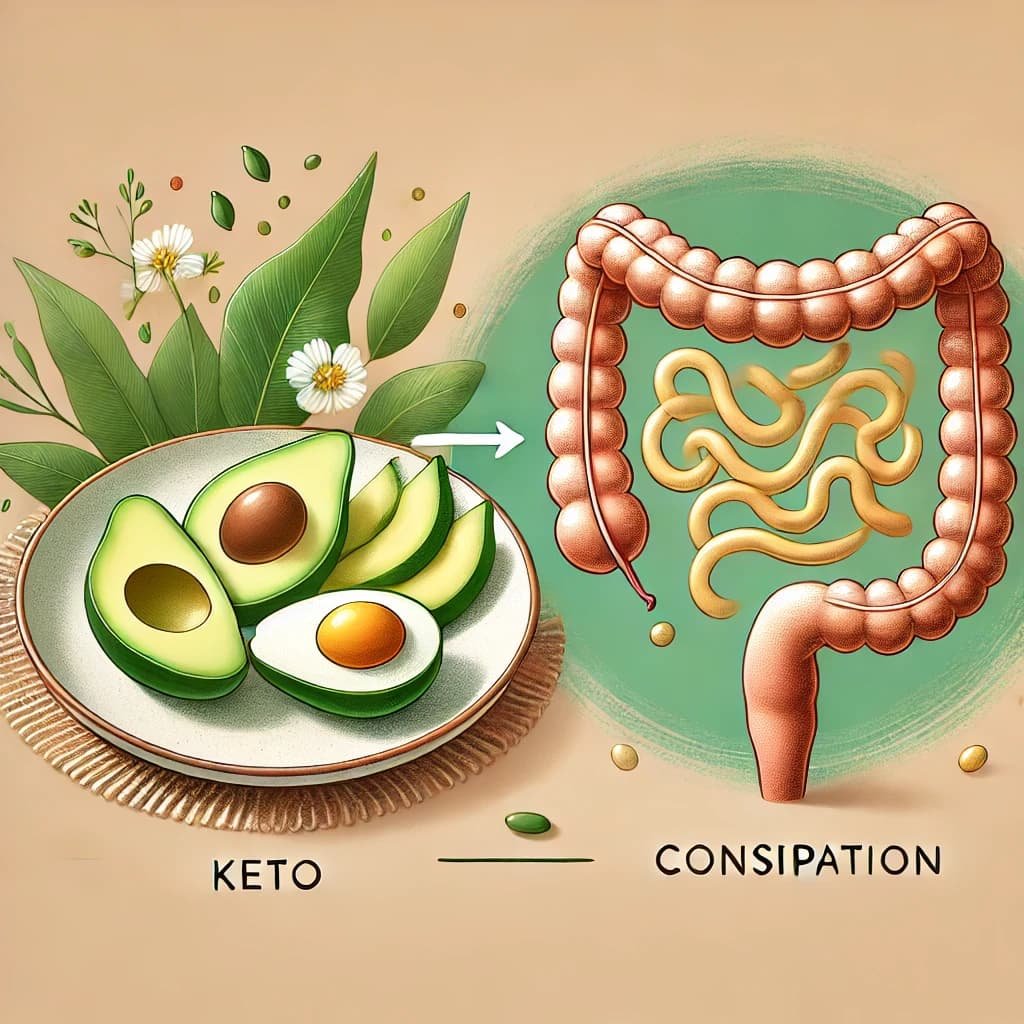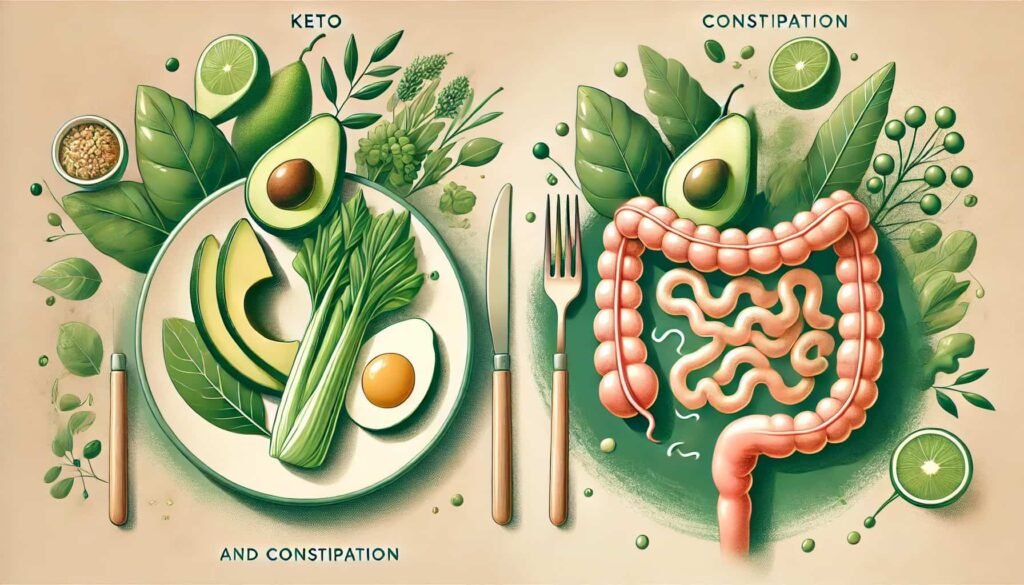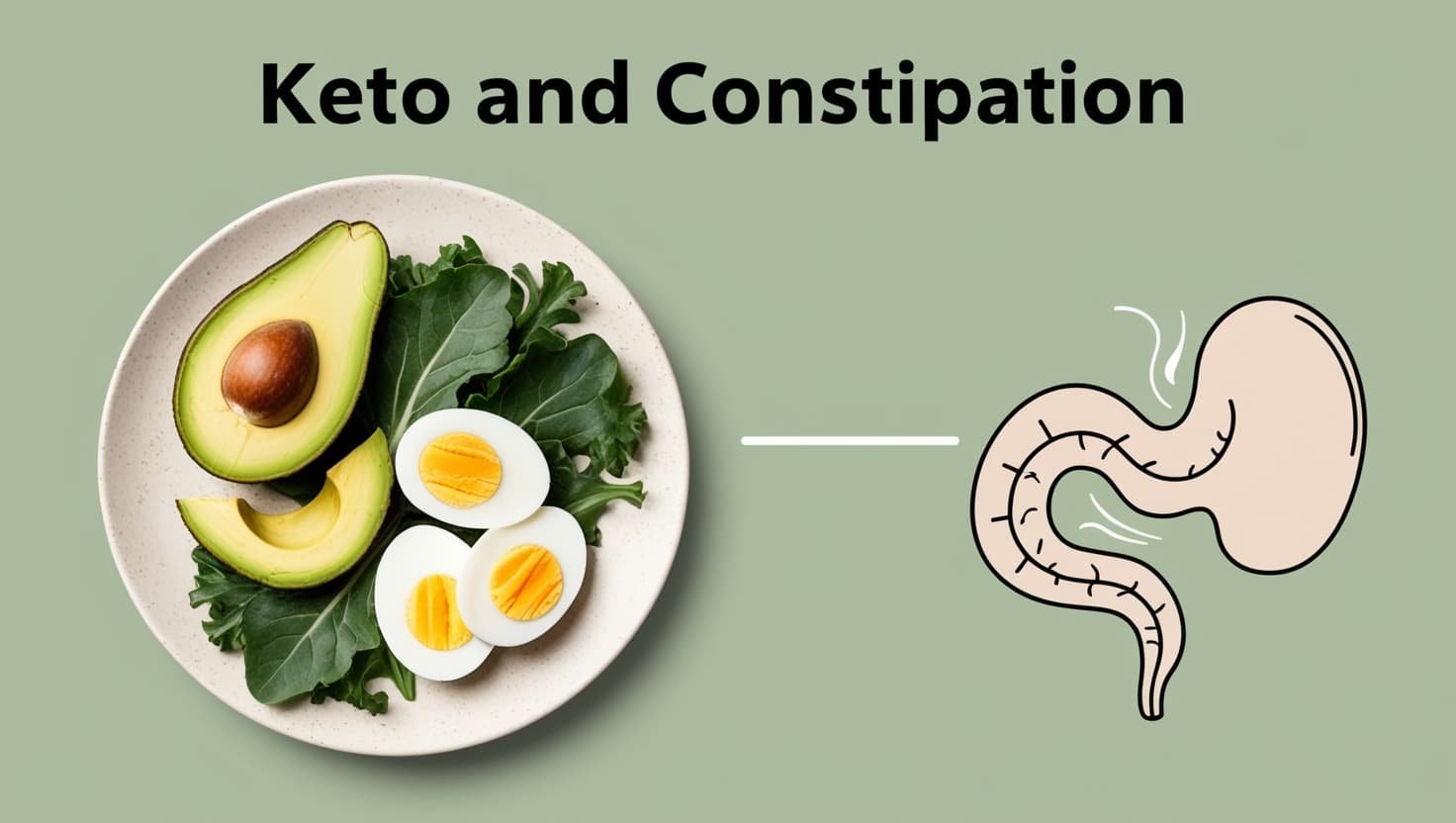Table of Contents
Toggleketo and constipation, Sarah stared at her bathroom mirror, feeling frustrated and uncomfortable. She had been following the keto diet for three weeks, hoping to shed some stubborn pounds and boost her energy levels. While she had noticed some positive changes, there was one unexpected and troubling side effect: constipation. She wondered, “Is this normal? Am I doing something wrong?”
If you’re like Sarah and experiencing digestive issues on your keto journey, you’re not alone. Many people encounter constipation when transitioning to a low-carb, high-fat diet. In this comprehensive guide, we’ll explore the relationship between the ketogenic diet and constipation, uncovering the causes and providing practical solutions to keep your digestive system running smoothly.
Understanding the Keto Diet and Its Impact on Digestion
The ketogenic diet is a high-fat, moderate-protein, and very low-carbohydrate eating plan designed to shift your body into a state of ketosis. In this metabolic state, your body burns fat for fuel instead of carbohydrates. While the keto diet has gained popularity for its potential weight loss and health benefits, it can also affect your digestive system in various ways.
How Keto Changes Your Gut

When you drastically reduce your carbohydrate intake, several changes occur in your digestive tract:
- Reduced fiber intake: Many high-fiber foods, such as whole grains and certain fruits, are limited on the keto diet.
- Altered gut microbiome: The sudden shift in macronutrients can affect the balance of beneficial bacteria in your gut.
- Changes in water balance: The initial water loss associated with keto can lead to dehydration.
- Increased fat consumption: Your body may need time to adjust to processing higher amounts of dietary fat.
These changes can contribute to digestive issues, including constipation, which is one of the most common complaints among keto dieters.
The Keto-Constipation Connection
Constipation on the keto diet is not uncommon, especially during the initial adaptation phase. Let’s delve into the main reasons why you might experience this uncomfortable side effect:
1. Insufficient Fiber Intake
Fiber plays a crucial role in maintaining regular bowel movements. On a standard diet, many people obtain fiber from grains, fruits, and starchy vegetables. However, these foods are often restricted on the keto diet, leading to a significant decrease in fiber intake.
2. Dehydration
The keto diet has a diuretic effect, causing your body to excrete more water and electrolytes. This can lead to dehydration, which is a common cause of constipation. Without adequate water, your stools can become hard and difficult to pass.
3. Electrolyte Imbalance
Along with water loss, the keto diet can cause an imbalance in electrolytes such as sodium, potassium, and magnesium. These minerals are essential for proper muscle function, including the muscles in your digestive tract.
4. Reduced Gut Motility
The high-fat content of the keto diet can slow down digestion and reduce gut motility. This slower transit time can contribute to constipation and feelings of fullness or bloating.
5. Changes in Gut Bacteria
Your gut microbiome plays a significant role in digestion and overall health. The sudden shift to a high-fat, low-carb diet can temporarily disrupt the balance of beneficial bacteria in your gut, potentially leading to digestive issues.
Strategies to Combat Keto-Related Constipation

Now that we understand why constipation can occur on the keto diet, let’s explore effective strategies to alleviate this issue and maintain a healthy digestive system:
1. Increase Your Fiber Intake
While staying within your carb limits, focus on incorporating more keto-friendly, high-fiber foods into your diet:
- Leafy greens (spinach, kale, Swiss chard)
- Broccoli and cauliflower
- Avocados
- Chia seeds and flaxseeds
- Nuts (almonds, pecans, walnuts)
- Berries (in moderation)
Consider using a fiber supplement like psyllium husk powder, which can add bulk to your stools without significantly impacting your carb intake.
2. Stay Hydrated
Proper hydration is crucial for preventing constipation. Aim to drink at least 8-10 glasses of water per day, and consider these tips:
- Carry a reusable water bottle with you throughout the day
- Set reminders on your phone to drink water regularly
- Consume hydrating foods like cucumber and zucchini
- Drink herbal teas or infused water for variety
3. Balance Your Electrolytes
Maintain proper electrolyte balance by:
- Adding salt to your meals or drinking bone broth
- Consuming potassium-rich foods like avocados and leafy greens
- Taking a magnesium supplement or using magnesium oil topically
- Considering an electrolyte supplement designed for keto dieters

4. Incorporate Probiotic and Prebiotic Foods
Support your gut health by including probiotic and prebiotic foods in your diet:
- Probiotic foods: Sauerkraut, kimchi, kefir, and unsweetened yogurt
- Prebiotic foods: Garlic, onions, leeks, and asparagus
You may also want to consider a high-quality probiotic supplement to support your gut microbiome during the transition to keto.
5. Engage in Regular Physical Activity
Exercise can help stimulate bowel movements and improve overall digestive health. Aim for at least 30 minutes of moderate activity most days of the week. This can include:
- Brisk walking
- Cycling
- Swimming
- Yoga or Pilates
6. Practice Stress Management
Stress can negatively impact digestion and contribute to constipation. Incorporate stress-reduction techniques into your daily routine:
- Meditation or mindfulness practices
- Deep breathing exercises
- Regular sleep schedule
- Journaling
7. Consider MCT Oil
Medium-chain triglyceride (MCT) oil can help promote regularity by lubricating the intestines and softening stools. Start with a small amount (1 teaspoon) and gradually increase to avoid digestive discomfort.
8. Experiment with Intermittent Fasting
Some people find that intermittent fasting can help regulate their bowel movements. If you’re new to fasting, start with a 12-hour overnight fast and gradually increase the fasting window if desired.
When to Seek Medical Advice

While constipation on the keto diet is often temporary and can be managed with lifestyle adjustments, there are times when you should consult a healthcare professional:
- If constipation persists for more than two weeks despite trying the above strategies
- If you experience severe abdominal pain or bloating
- If you notice blood in your stools
- If you have unexplained weight loss or fever accompanying constipation
Your doctor can help rule out any underlying conditions and provide personalized advice for managing your digestive health on the keto diet.
The Long-Term Outlook: Adapting to Keto
As your body adapts to the ketogenic diet, you may find that your digestive issues, including constipation, improve over time. Many people report that their bowel movements become more regular and comfortable after the initial adaptation phase, which can last anywhere from a few weeks to a couple of months.
Remember that everyone’s body is different, and what works for one person may not work for another. Be patient with your body and willing to make adjustments to your diet and lifestyle as needed. With the right approach, you can enjoy the benefits of the keto diet while maintaining a healthy digestive system.
Conclusion: Balancing Keto and Digestive Health
Constipation can be a challenging side effect of the ketogenic diet, but it doesn’t have to derail your health goals. By understanding the causes and implementing the strategies outlined in this article, you can maintain regular bowel movements and overall digestive health while reaping the benefits of a low-carb lifestyle.
Remember to focus on nutrient-dense, fiber-rich foods within your keto framework, stay hydrated, and listen to your body’s needs. With patience and persistence, you can find the right balance that works for you, allowing you to enjoy the potential benefits of the keto diet without compromising your digestive well-being.
Frequently Asked Questions (FAQ)
How long does keto-related constipation typically last?
Keto-related constipation often improves within a few weeks to a couple of months as your body adapts to the diet. However, this can vary from person to person.
Can I take laxatives while on the keto diet?
While occasional use of gentle, osmotic laxatives like magnesium citrate may be okay, it’s best to address the underlying causes of constipation through diet and lifestyle changes. Consult your healthcare provider before using laxatives regularly.
Are there any specific foods I should avoid on keto to prevent constipation?
While there aren’t specific foods to avoid, be cautious with foods that may be constipating for you personally, such as dairy or artificial sweeteners. Focus on incorporating more fiber-rich, keto-friendly foods instead.
Can constipation affect my weight loss progress on keto?
While constipation can cause temporary weight fluctuations due to retained waste, it shouldn’t significantly impact your long-term weight loss progress if you’re following the diet correctly.
Is it normal to have less frequent bowel movements on the keto diet?
Some people may experience less frequent bowel movements on keto due to reduced food volume and changes in gut bacteria. As long as you’re comfortable and not experiencing pain or bloating, this can be normal for some individuals.





